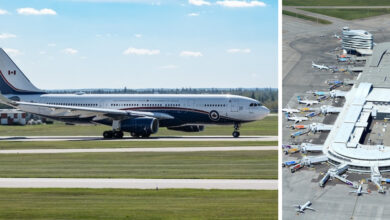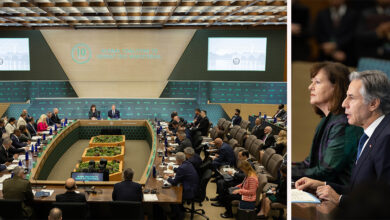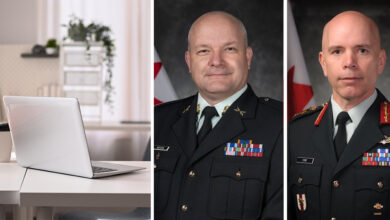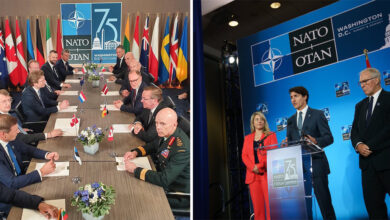Today’s News
Minister of Defence Releases Canadian Military Colleges Review Board Report
Above images: Left, Military Colleges Review Board members, right, Canadian Military Colleges images courtesy of the Canadian Government.
The first Report of the newly established Canadian Military Colleges (CMC) Review Board was released and announced on March 7 by Bill Blair, Minister of National Defence.
The CMC Review Board was set up in December 2023 in response to Recommendation 28 and the first part of Recommendation 29 of former Supreme Court of Canada Justice Louise Arbour’s Independent External Comprehensive Review (IECR) Report.
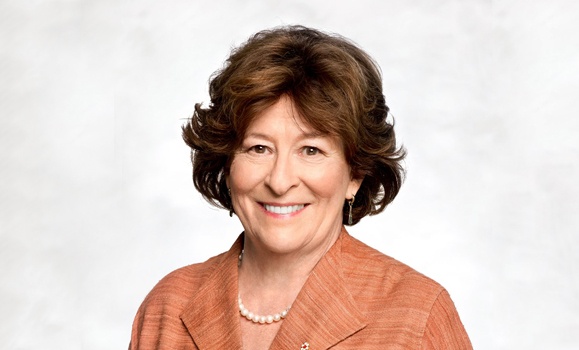
49 Recommendations
The Report highlights the enduring value of the Canadian Military Colleges and provides 49 recommendations. The Department of National Defence and the Canadian Armed Forces will review the Report and respond to its recommendations.
“I’d like to thank the Canadian Military Colleges Review Board members for their important work, professionalism and dedication,” stated Minister Blair. “And all Canadians who shared their knowledge and expertise with the Review Board. Canada’s Military Colleges are critical national institutions. This Report will enable us to make meaningful changes and investments necessary to prepare our people to protect Canada’s sovereignty in a complex and uncertain global security environment.”
The Review Board analyzed the costs, benefits, advantages, and disadvantages of continuing to educate Naval and Officer cadets within the Regular Officer Training Plan at Canada’s two military colleges – the Royal Military College of Canada (RMC) in Kingston, Ontario and RMC Saint-Jean, in Saint-Jean-sur-Richelieu, Quebec. It also reviewed the current quality of education, socialization, and military training at the colleges and assessed different education and training models.
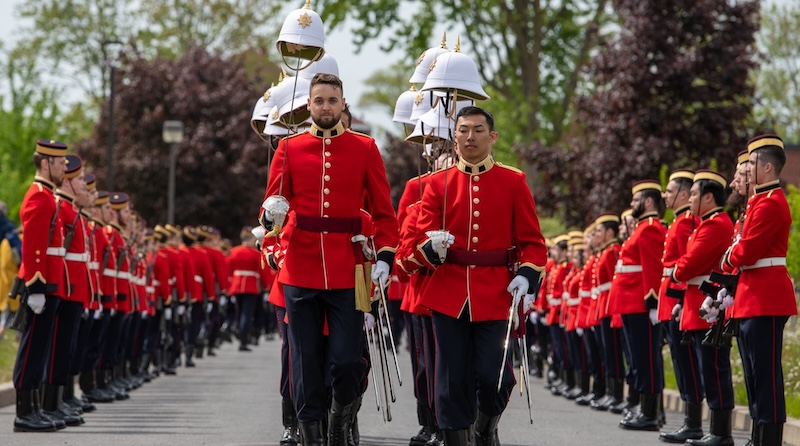
Developing Effective and Ethical Leaders
“Canadian Military Colleges play an important role in the education of our officers,” stated Dr. Kathy Hogarth, Chairperson of the Review Board. “The recommendations support the development of effective and ethical leaders for the Canadian Armed Forces.”
The CMC Review Board comprises five external education and culture experts, a DND public service executive and a CAF representative. Board members were chosen for their range of perspectives and backgrounds, as well as for their independence and impartiality.
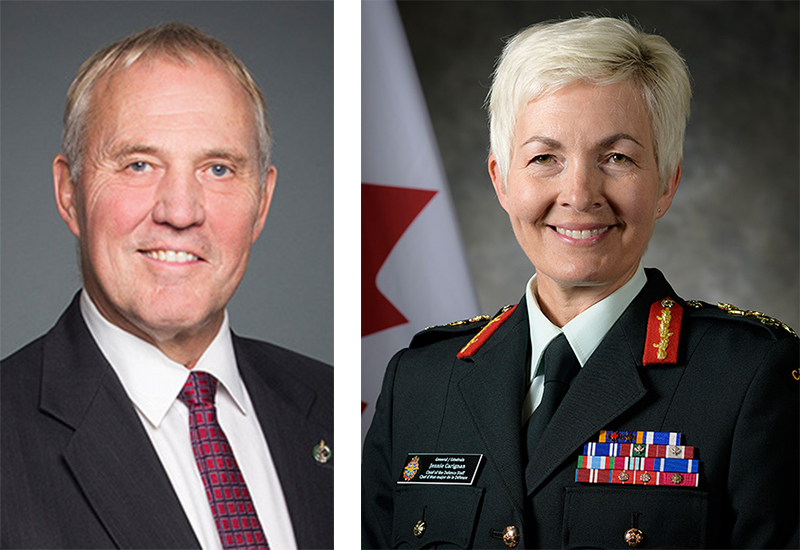
“I would like to thank the Canadian Military Colleges Review Board and Canadians for their thoughtful and insightful contributions,” said General Jennie Carignan, Chief of the Defence Staff. “Over the last year, we engaged with a wide cross-section of current and former Canadian Armed Forces members, allies, and experts in the field to closely analyze the culture, the environment, and the training provided at Canada’s military colleges. The military colleges remain a key asset to the Department of National Defence and Canada as a nation. Implementing the 49 recommendations in this Report will contribute to an environment at the military colleges where Naval and Officer Cadets are safe, respected, and well trained.”
Minister Blair said the well-being of CMC Naval and Officer Cadets and staff is a top priority for the Defence Team. Recommendation 28 of the IECR recommends eliminating the Cadet Wing peer leadership structure and Recommendation 29 calls for an additional review of the costs and benefits of educating officers through military colleges.
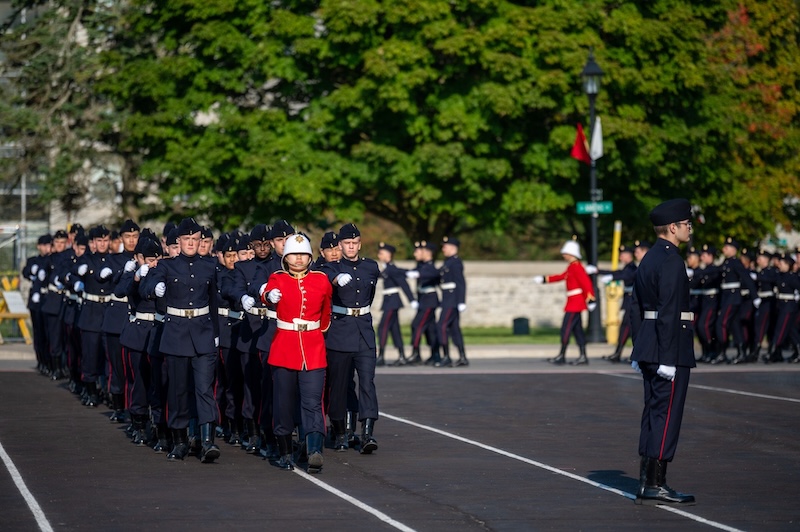
Educate and Develop Officers
Canada’s two military colleges educate and develop a portion of the officers who serve in the CAF’s Regular Force. Both military colleges grant undergraduate degrees, and RMC in Kingston also grants graduate degrees.
Founded in 1874, RMC Kingston opened its doors to the first class of 18 officer cadets on June 1, 1876. RMC Saint-Jean, formerly Collège militaire royal de Saint-Jean, originally opened in 1952. It temporarily closed its doors in 1995 and reopened in May 2008. It returned to full university status in 2022.
Over the past year, Review Board members consulted and engaged with over 1,500 individuals, including Department of National Defence employees, Canadian Armed Forces members, alums, academic and non-public fund CMC employees, and Canadians. Hogarth said consultation was a key part of the Review Board’s mandate and included visits to allied and partner nations’ military academies and several visits to both CMCs.
Read more about Review Board members here.

List of Recommendations
Recommendation #1
Maintain the Canadian Military Colleges as undergraduate degree-granting institutions. Continue to train and educate Naval and Officer Cadets at the Canadian Military Colleges through an Integrated Model.
Recommendation #2
Revise governance structures, authorities, activities, programs and training to reflect the fact that the Canadian Military Colleges are first and foremost military institutions responsible for training and educating officers as members of the Profession of Arms.
Recommendation #3
Amend the Ministerial Organizational Orders to change the name of the Royal Military College of Canada to the ‘Royal Military College of Canada, Kingston’, (RMC Kingston) and the name of the Royal Military College Saint-Jean (RMC Saint-Jean) to the ‘Royal Military College of Canada, Saint-Jean-sur-Richelieu’, (RMC Saint-Jean).
Recommendation #4
Update all branding, marketing materials, public affairs and communications products to align with the changes proposed under Recommendation #2 and Recommendation #3 and to support a revised recruitment strategy.
Recommendation #5
Remove the Minister of National Defence from the position of Chancellor and President of the two Canadian Military Colleges. Amend the Queen’s Regulations and Orders for the Canadian Military Colleges accordingly.
Recommendation #6
Appoint an eminent Canadian to the ceremonial role of Chancellor of the two Canadian Military Colleges. Amend the Queen’s Regulations and Orders for the Canadian Military Colleges accordingly.
Recommendation #7
Re-designate the Board of Governors at each Military College as an Advisory Committee that advises and makes recommendations to the Commandant. Update the Queen’s Regulations and Orders for the Canadian Military Colleges accordingly.
Recommendation #8
Clarify the parameters of the Senate’s authority and stipulate that the responsibility to allocate resources and set priorities in relation to academic programs at the Military Colleges lies with the Commandant. Update the Queen’s Regulations and Orders for the Canadian Military Colleges accordingly.
Recommendation #9
Designate the Commandants as the “President and Vice-Chancellor” of their respective Military Colleges, vested with appropriate authorities and responsibilities. Amend the Queen’s Regulations and Orders for the Canadian Military Colleges accordingly.
Recommendation #10
Establish the tenure of the Commandant at each Military College for a minimum of four years.
Recommendation #11
‘Deep select’ the Commandant for each Military College and use a Developmental Period Four Fellowship Program and/or university President training program to expose them to university governance and operations.
Recommendation #12
Re-designate the Principal at each Military College as the Provost and Vice-President Academic & Research and appoint them, via a Governor-in-Council process, as the most senior academic officer of their respective Colleges, reporting to the Commandant. Amend the Queen’s Regulations and Orders for the Canadian Military Colleges accordingly.
Recommendation #13
Establish the tenure of the Director of Cadets for a minimum of three years.
Recommendation #14
Streamline the academic offerings at the Canadian Military Colleges to offer four undergraduate degrees within the Regular Officer Training Plan: a Bachelor of Arts (at RMC and RMC Saint-Jean); a Bachelor of Science (at RMC and RMC Saint-Jean); a Bachelor of Military Arts and Science (at RMC and RMC Saint-Jean); and a Bachelor of Engineering (at RMC).
Recommendation #15
Establish a minimum 15:1 student-to-faculty ratio at both Canadian Military Colleges within five years.
Recommendation #16
Increase the number of Naval and Officer Cadets at the Canadian Military Colleges to a minimum of 1850 within five years.
Recommendation #17
Eliminate the Core Curriculum at the Canadian Military Colleges.
Recommendation #18
Eliminate the Collège d’enseignement général et professionnel program at the Royal Military College Saint-Jean and all associated teaching and administrative positions.
Recommendation #19
Harmonize the academic calendars between the Royal Military College of Canada and the Royal Military College Saint-Jean and align them with the reconfigured Military Skills & Leadership strand proposed under Recommendation #22.
Recommendation #20
Establish and publish the Regular Officer Training Plan – Canadian Military Colleges Program Standard.
Recommendation #21
Design, develop and implement the Integrated Officer Development Program.
Recommendation #22
Design, develop, implement and accredit the Military Skills & Leadership strand.
Recommendation #23
Create new civilian instructor positions at both the Royal Military College of Canada and the Royal Military College Saint-Jean to support the Military Skills & Leadership strand.
Recommendation #24
Reduce military faculty positions at both Military Colleges and their associated Advanced Training List positions and reallocate those positions to support the Military Skills & Leadership strand.
Recommendation #25
Increase the baseline Salary Wage Envelope allocation to the Canadian Military Colleges to create and fund permanent administrative support staff positions to support the Squadron leadership teams. Allocate one administrative support staff position per Squadron.
Recommendation #26
Design, develop, implement and accredit a revised Second Language Training strand.
Recommendation #27
Offer optional, ongoing second language training to Naval and Officer Cadets who have attained the BBB commissioning requirement.
Recommendation #28
Design, develop, implement and accredit a revised Fitness, Health & Well-being strand.
Recommendation #29
Eliminate the Physical Performance Test as a mandatory activity at the Canadian Military Colleges.
Recommendation #30
Establish the Fitness for Operational Requirements of Canadian Armed Forces Employment (FORCE) Test as the physical fitness standard for the Regular Officer Training Plan – Canadian Military Colleges.
Recommendation #31
Reduce the Cadet Chain of Responsibility at both Canadian Military Colleges to three types of positions: Cadet Squadron Leaders, Cadet Flight Leaders and Cadet Section Leaders.
Recommendation #32
Establish as a commissioning requirement that all Third Year Naval and Officer Cadets complete a session as a Cadet Section Leader.
Recommendation #33
Establish and incentivize optional leadership opportunities for Fourth Year Naval and Officer Cadets to fill Cadet Flight Leaders and Cadet Squadron Leaders positions.
Recommendation #34
Eliminate the Cadet Wing HQ and Division positions at the Royal Military College of Canada. Retain positions such as administrative roles and team captains but remove them from the Cadet Chain of Responsibility and eliminate their use as a graduation requirement.
Recommendation #35
Design, develop and implement the Advanced Leader Development Program to better prepare the Training Wing staff to support the Cadet Chain of Responsibility and to incentivize postings to the Canadian Military Colleges for Captains and Warrant Officers.
Recommendation #36
Reduce Military Faculty positions and their associated Advanced Training List positions and reallocate those positions to the Advanced Leadership Development Program to support the leadership development of the Naval and Officer Cadets and provide greater mentorship to the Cadet Chain of Responsibility.
Recommendation #37
Ensure that the Military Skills & Leadership strand equips Naval and Officer Cadets to be successful as Cadet Section Leaders.
Recommendation #38
Remove from the Cadet Chain of Responsibility all authority – and all appearance of authority – to impose corrective measures or loss of privileges, in order to ensure that no Naval and Officer Cadet has disciplinary authority, real or perceived, over another Naval and Officer Cadet.
Recommendation #39
Amend the policy framework at the Canadian Military Colleges to address gaps identified by the Assistant Deputy Minister (Review Services) in its Advisory on Sexual Violence Prevention at Canadian Military Colleges.
Recommendation #40
Mandate experts in the field of sexual misconduct prevention and response to assess the effectiveness and impact of the policies and procedures of the Canadian Military Colleges.
Recommendation #41
Assign release authority for Naval and Officer Cadets at the Canadian Military Colleges to the Commander of the Canadian Defence Academy for the following release items:
-
5d – Not advantageously employable – conduct deficiency
-
5f – Unsuitable for further service – conduct deficiency
-
Recommendation #42
Establish a Health, Safety and Well-being Resource Centre at each Military College, staffed by professionals with a wide range of relevant expertise and sufficiently resourced to deliver on its mandate to provide prevention and response support to the Canadian Military Colleges seven days a week.
Recommendation #43
Increase the percentage of female Naval and Officer Cadets at the CMCs to 33% by 2035.
Recommendation #44
Establish a dedicated funding framework for major capital projects, minor construction, and maintenance and repair to support training and education establishments in the Canadian Armed Forces, including the Canadian Military Colleges.
Recommendation #45
Increase baseline funding for major capital projects, minor construction, and maintenance and repair at the Canadian Military Colleges.
Recommendation #46
Establish a dedicated facilities management contract at the Royal Military College of Canada, similar to that which existsat the Royal Military College Saint-Jean.
Recommendation #47
The Minister of National Defence provide a publicly available written response to the recommendations contained in this Report within 60 days of its receipt.
Recommendation #48
The Deputy Minister of National Defence and the Chief of the Defence Staff establish an Implementation Team to enable the implementation of these recommendations, within the framework of a sequenced, time-bound and measurable Implementation Plan.
Recommendation #49
The Minister of National Defence provide a publicly available Annual Report on the progress of implementation until such time as all the recommendations have been addressed.




